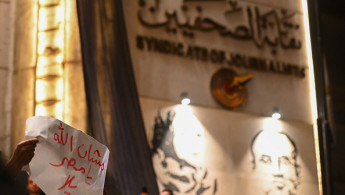'Canned accusations': Egyptian journalists call for release of jailed colleagues
Dozens of Egyptian journalists gathered at the headquarters of the Journalists' Syndicate in downtown Cairo on Monday evening to express solidarity with 23 jailed colleagues in a country ranked as the world's third-worst jailer of journalists.
The move came after journalist Khaled Mamdouh and satirical cartoonist Ashraf Omar had been detained from their homes on separate night raids earlier this month, sparking the outrage of rights groups and free press advocates.
Mamdouh's son, Shehab, said during the press conference that his father had refrained from covering Egyptian affairs for years.
"My father quit his job at [the Saudi] MBC Group in 2019 to object to the management's decision to lay off several of his staff during the COVID-19 pandemic," the son said.
"Since then, he had been freelancing to provide for his family. And he had been in touch from time to time with state security officers who would talk to him briefly and let him go," Shehab added, without further elaborating.
Legal rights denied
Mamdouh and Omar were subjected to enforced disappearance for days prior to their appearance before the state prosecution's office.
Both men have been faced with what the head of the syndicate's freedoms committee, Mahmoud Kamel, metaphorically, described as "canned accusations."
Over the past decade, regime critics, activists and journalists were commonly detained and accused with a set of similar charges, with no evidence: "involved in a terrorist group, disseminating false news and misusing social media tools."
Mamdouh's brother-in-law, Nagy Kamel, previously claimed in various interviews and on social media posts that the veteran journalist recently received a job offer from United Media Services, a TV organisation reportedly funded and controlled by Egypt's intelligence agencies; implying, that Mamdouh did not raise red flags for authorities.
Mamdouh's lawyer, Fatemah Serag, said during Monday's press conference that she had been denied access to her client.
"I was not allowed to talk to Khaled to check on him and discuss the case," she told the attendees.
"The prosecutor's interrogation was brief, entailing no details on charges, any evidence that may implicate Mamdouh, concrete facts or police investigations," she added.
For his part, the head of Journalists Syndicate Khaled El-Balshy said, "The authorities had rejected at least 10 official requests by the union to visit the 23 jailed colleagues."
"Many of the journalists currently behind bars have exceeded the legal pre-trial detention limit of two years without trial, with some held for over seven years," Balshy said.
"We dream of a day when there are no colleagues held behind bars. It's not too much to ask for fellow journalists to be among us," he added, with a sigh.
Rapid fall in rights
Fame may have made its way towards Omar following his detention. In recent days, his name has been trending on social media, while his controversial cartoons that criticise socioeconomic mismanagement and alleged corruption have been widely shared online.
"A person held behind bars is not jailed alone; his family is imprisoned with him," Nada Mugheeth, Omar's wife, said.
"They [the authorities] can never jail Asharaf's writings and cartoons, though," she added.
In a cartoon published on Al-Manassa news outlets, one of the few remaining independent voices in Egypt, Omar depicts a government official as a thief offering a map of Egypt to a man dressed in a traditional Gulf outfit and holding a shopping cart.
Sisi has been running the country with an iron fist since he took office following a military coup in 2013. Media freedom and civil rights have sharply deteriorated since then.
Some 600 local and international news sites have also been blocked in Egypt, including A-Manassa and Al-Araby Al-Jadeed, the Arabic-language sister publication to The New Arab.




 Follow the Middle East's top stories in English at The New Arab on Google News
Follow the Middle East's top stories in English at The New Arab on Google News
![A group of Palestinians, foreign and Israeli activists gather to participated in an olive picking event on the land in the town of Battir, which is under threat of confiscation by Israel in Bethlehem, occupied West Bank on 8 November 2024. [Getty]](/sites/default/files/styles/image_330x185/public/2182930803.jpeg?h=199d8c1f&itok=__0LgGsa)

![People gathered around the rubble of destroyed houses to search for survivors [Getty]](/sites/default/files/styles/image_330x185/public/2024-11/GettyImages-2184733820.jpg?h=199d8c1f&itok=NiM1LO2f)